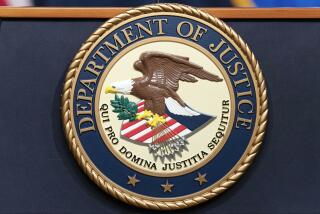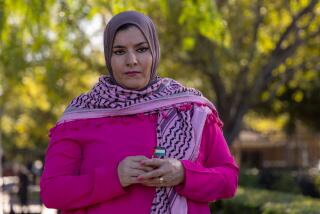FBI Informer Begins His Testimony in Terror Trial
SACRAMENTO — In the summer of 2002, a clean-cut Pakistani man driving a shiny white Dodge Durango suddenly appeared in a Muslim neighborhood of Lodi, the San Joaquin Valley grape farming center an hour’s drive south of the state capital.
Naseem Khan, then 28, rented an apartment overlooking the Lodi Mosque, befriended the town’s Muslim religious leaders and, over the next three years, secretly taped hundreds of hours of conversations with members of the largely Pakistani American community as a paid undercover agent for the FBI.
A McDonald’s restaurant manager in Bend, Ore., when he was recruited by the FBI in late 2001, Khan began his testimony Wednesday as the star government witness in the federal terrorism trial of Lodi ice cream truck driver Umer Hayat, 48, and his son Hamid Hayat, 23.
The younger Hayat is charged with supporting terrorism by attending training camps in Pakistan in 2000 and 2003. Both men are charged with lying to the FBI about Hamid Hayat’s alleged attendance at the camps. Key to the government case are taped conversations in 2003 between Hamid Hayat and Khan.
Briefly questioned by federal prosecutors in court Wednesday, Khan said he initially accepted the undercover work without expecting to be paid because of his love for the United States, where he has lived since 1990.
“I just wanted to help the country,” he said.
But beginning in 2002, Khan -- who grew up in Peshawar, Pakistan, and speaks fluent Pashtu and Urdu -- began to be paid handsomely for his undercover work, receiving nearly $250,000 for his efforts in Lodi alone. In the meantime, Khan converted his green card to full-fledged American citizenship.
Defense attorneys, who will cross-examine Khan today, say those benefits provided Khan the incentive to engineer a case against their clients.
Some Lodi residents contend that Khan was more than just a passive mole in the mosque. They said he was often an instigator, asking young men about waging jihad and encouraging travelers to Pakistan to bring back firebrand speeches and extremist documents.
Richard McIntyre, a Muslim convert who attends the Lodi Mosque, said Khan “really slithered his way in there and became actually good friends with the imams.” According to Lodi Muslims, Khan took Imam Mohammad Adil Khan’s younger children to amusement parks and he gave Imam Shabbir Ahmed a cellphone.
The practice of recruiting Muslims to secretly report on their co-worshipers has recently come under fire by California religious leaders.
Earlier this week, Shakeel Syed, executive director of the Islamic Shura Council of Southern California, which serves 70 mosques in Los Angeles and surrounding areas, said that in the last 18 months, four Muslim immigrants have been approached by the FBI and asked to spy on clergy in exchange for help in obtaining residency.
Syed said all four -- two from the Middle East and two from Africa -- declined but were fearful that their rejections would be used against them.
“There is a great deal of fear in the community,” Syed said, “because of this climate in which innocent people are being manipulated and harassed.”
Syed said he and other religious leaders have met with FBI officials to complain about the practice.
In a victory for the defense Wednesday, U.S. District Judge Garland E. Burrell Jr. allowed into evidence Khan’s 1993 conviction for second-degree burglary.
According to court records in Yuba City, Khan and a co-defendant, who shared an address with him in neighboring Marysville, spent two days in Sutter County Jail on a two-count felony charge of passing bad checks. After the charges were reduced to a single misdemeanor burglary charge, both pleaded guilty and received three years’ summary probation and matching $211 fines.
Federal prosecutors wanted to keep this information from the jury, arguing that the conviction was too old, a minor offense and occurred when Khan, then working in a Yuba City restaurant, was only 19.
But attorney Johnny L. Griffin III, who represents Umer Hayat, contended that the conviction demonstrated Khan’s “lack of trustworthiness” and should be included in the evidence.
Federal court records show that the ongoing FBI investigation was originally focused on the two imams. Arrested last summer, the two religious leaders were charged with routine immigration violations and were voluntarily deported last year to their native Pakistan.
According to Basim Elkarra, Sacramento director of the Council on American-Islamic Relations, the clerics became suspicious of Khan because he asked so many questions.
“The imams used to warn people about this guy,” Elkarra said.
Assistant U.S. Atty. Laura Ferris has said the government plans to introduce at least seven tape-recordings of conversations between Khan and Hamid Hayat, including three telephone exchanges when the younger Hayat was in Pakistan during 2003-04.
“Hamid talked to Mr. Khan about jihad,” Ferris said. “Jihad. Jihad. Jihad.”
According to Hayat’s defense attorney, Wazhma Mojaddidi, Khan met her client in August 2002. Despite their difference in age, Khan become so close to the younger Hayat that he sometimes spent the night on the floor of the Hayat family’s home before Hayat accompanied his mother and sister to Pakistan in the spring of 2003.
“In most of the recorded conversations,” Wazhma said in her opening arguments, “Naseem is the instigator. Naseem plays the role of a man who does not like the U.S.”
More to Read
Sign up for Essential California
The most important California stories and recommendations in your inbox every morning.
You may occasionally receive promotional content from the Los Angeles Times.










